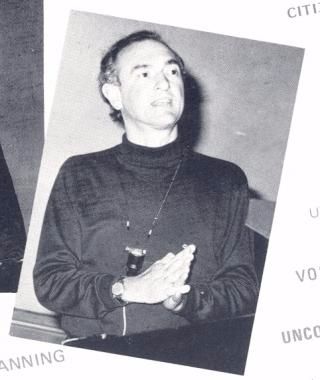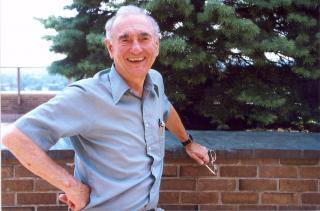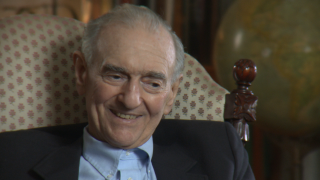Biography
Wolf Peregrin Joachim Wolfensberger was born July 26, 1934, in Mannheim, Germany, the youngest of three children. Like many other children in Europe during World War II, he was evacuated on two different occasions to the relative safety of the countryside, where he was taken in by farm families until the end of the war.
With his mother, he emigrated to the US in 1950. They came to Tennessee, but eventually he also lived in the states of Indiana, Missouri, New Jersey, Michigan, Nebraska, and New York.
In February 1960, he married Nancy Artz from Indiana, and they had three children–Margaret, Joan, and Paul–and eventually three grandchildren: John Tate, Jennifer, and Hadley Sager.
 He obtained his bachelor’s degree in philosophy from Siena College (now defunct) in Memphis, Tennessee, while also working virtually full-time. He received a master’s in psychology and education from St. Louis University in Missouri, and a doctorate in mental retardation research from George Peabody College in Nashville, Tennessee (now part of Vanderbilt University there), where he was in the first class of doctoral students for that field of study. Both during his studies and after he received his degrees, he worked in large state mental retardation institutions in Indiana, Tennessee, New Jersey, and Michigan, as well as at a psychiatric hospital in Missouri and at the Maudsley Hospital in London, England under a post-doctoral fellowship. Upon his return to the US, he worked for seven years in Omaha, Nebraska at the University of Nebraska Medical Center’s Nebraska Psychiatric Institute. It was in Nebraska that he worked with a citizens’ action group to establish the first in the nation system of normalization-based community services for mentally retarded people.
He obtained his bachelor’s degree in philosophy from Siena College (now defunct) in Memphis, Tennessee, while also working virtually full-time. He received a master’s in psychology and education from St. Louis University in Missouri, and a doctorate in mental retardation research from George Peabody College in Nashville, Tennessee (now part of Vanderbilt University there), where he was in the first class of doctoral students for that field of study. Both during his studies and after he received his degrees, he worked in large state mental retardation institutions in Indiana, Tennessee, New Jersey, and Michigan, as well as at a psychiatric hospital in Missouri and at the Maudsley Hospital in London, England under a post-doctoral fellowship. Upon his return to the US, he worked for seven years in Omaha, Nebraska at the University of Nebraska Medical Center’s Nebraska Psychiatric Institute. It was in Nebraska that he worked with a citizens’ action group to establish the first in the nation system of normalization-based community services for mentally retarded people.
He was then invited to the National Institute on Mental Retardation in Toronto, Ontario, Canada for two years, to conduct training and consultation for service reform across Canada. In 1973 he went to Syracuse University in Syracuse, New York. There he worked until his death in February 2011. In addition to being a full-time professor on the faculty of the School of Education at Syracuse University, he also founded and ran the Training Institute for Human Service Planning, Leadership, and Change Agentry, an institute devoted to training and developing leaders and change agents in human services of all types to all types of people, with the aim of bringing about services that would be rational, moral, humane and beneficial to recipients, that would promote greater societal acceptance of the people served (who are so frequently rejected and “put away” by society), and in which service would be ennobling of the servers.
 To this end, Dr. Wolfensberger conducted training events, as well as consultations, all over the world, but primarily in the US and Canada, and primarily in the field of mental retardation. However, neither his scholarship nor his teaching were limited to that field, but also addressed the fields of aging, mental health, poverty, and indeed any human service of any kind to any kind of clientele. These trainings covered the topics of human service ideologies; the planning and adaptive structuring of service systems; evaluation of service quality; the operation of residential services, and especially of entire residential service systems; the social integration of service recipients; voluntary action on behalf of social change; social advocacy for classes of people who are marginalized and rejected in society; the history of human services; and analysis and critiques of many contemporary phenomena in the field of service, ranging from fads to ominous developments. He ceaselessly worked at developing young people to assume leadership positions in human services, and to challenge people with any kind of involvement in or connection to human services to recognize the important moral and values issues at stake in services, and to take a stand on behalf of the lowly and oppressed, even if so doing would be costly. In both the classes he taught at the university, and in his training workshops, he was known for being very demanding of students, and challenging them to strive for the highest levels of effort and performance. In all his teaching, he explained and emphasized the universals of service that apply at all times and anywhere. In fact, he taught that learning the universals was the best protection against falling for bad service practices, and for protecting good ones.
To this end, Dr. Wolfensberger conducted training events, as well as consultations, all over the world, but primarily in the US and Canada, and primarily in the field of mental retardation. However, neither his scholarship nor his teaching were limited to that field, but also addressed the fields of aging, mental health, poverty, and indeed any human service of any kind to any kind of clientele. These trainings covered the topics of human service ideologies; the planning and adaptive structuring of service systems; evaluation of service quality; the operation of residential services, and especially of entire residential service systems; the social integration of service recipients; voluntary action on behalf of social change; social advocacy for classes of people who are marginalized and rejected in society; the history of human services; and analysis and critiques of many contemporary phenomena in the field of service, ranging from fads to ominous developments. He ceaselessly worked at developing young people to assume leadership positions in human services, and to challenge people with any kind of involvement in or connection to human services to recognize the important moral and values issues at stake in services, and to take a stand on behalf of the lowly and oppressed, even if so doing would be costly. In both the classes he taught at the university, and in his training workshops, he was known for being very demanding of students, and challenging them to strive for the highest levels of effort and performance. In all his teaching, he explained and emphasized the universals of service that apply at all times and anywhere. In fact, he taught that learning the universals was the best protection against falling for bad service practices, and for protecting good ones.
 Throughout his career, he was active in voluntary associations of many types, and encouraged this sort of citizen activism. He was a prolific writer: he wrote or co-authored over 50 books and monographs, over 60 chapters, over 140 articles in major publications and 99 in minor ones, 28 reviews, and six poems. Both Dr. Wolfensberger himself and his teachings were controversial. He appealed to those in the 1960s and ’70s who wanted to see significant changes in what were then largely segregated and institutional services for handicapped people, but there was strong resistance to such change. Then, starting in the 1980s and until his death, his teaching alerted people to the problems and dangers in the new “reformed” services, to societal value changes that were dangerous for handicapped people, and especially to the growing acceptance of what he termed “deathmaking” of unwanted people, and all these teachings stirred up opposition even among those who had once supported and embraced his earlier teachings.
Throughout his career, he was active in voluntary associations of many types, and encouraged this sort of citizen activism. He was a prolific writer: he wrote or co-authored over 50 books and monographs, over 60 chapters, over 140 articles in major publications and 99 in minor ones, 28 reviews, and six poems. Both Dr. Wolfensberger himself and his teachings were controversial. He appealed to those in the 1960s and ’70s who wanted to see significant changes in what were then largely segregated and institutional services for handicapped people, but there was strong resistance to such change. Then, starting in the 1980s and until his death, his teaching alerted people to the problems and dangers in the new “reformed” services, to societal value changes that were dangerous for handicapped people, and especially to the growing acceptance of what he termed “deathmaking” of unwanted people, and all these teachings stirred up opposition even among those who had once supported and embraced his earlier teachings.
Dr. Wolfensberger died in Syracuse, New York, on February 27, 2011, and is buried in the plot of his wife’s family in southern Indiana.
Susan Thomas (April 2017)
